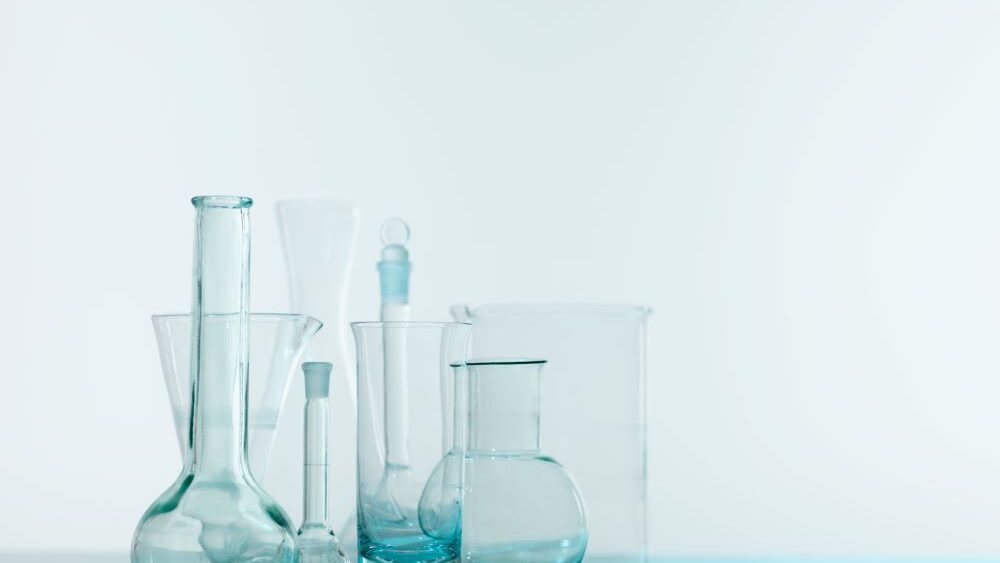Laboratory glassware is an indispensable utensil in every laboratory, whether in the field of chemistry, biology or in school laboratories. To ensure that they function optimally and remain durable, proper care and cleaning are essential. For this reason, laboratory glassware is made so that it can be cleaned easily and quickly. Laboratory glassware is made of smooth non-porous glass, which makes it difficult for dirt to settle on its surfaces. The transparency also means that any contamination can be detected and removed immediately. It is crucial to choose the right type of cleaning and the right utensils. Here you can find out everything you need to know about the correct care and cleaning of lab glasses.
Correct cleaning
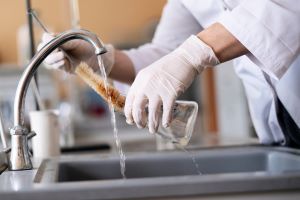 Especially in the professional field, thorough and professional cleaning of laboratory glassware is indispensable. There are many things to consider here. In the meantime, however, test tubes and the like can also be found in the household, in the catering trade or as decorative or storage elements in many areas. When used outside the laboratory, of course, less thorough and careful care must be taken, but the glassware must shine beautifully. By the way, we always recommend cleaning new laboratory glassware once before using it for the first time, as contamination can occur during storage and transport, for example due to packaging.
Especially in the professional field, thorough and professional cleaning of laboratory glassware is indispensable. There are many things to consider here. In the meantime, however, test tubes and the like can also be found in the household, in the catering trade or as decorative or storage elements in many areas. When used outside the laboratory, of course, less thorough and careful care must be taken, but the glassware must shine beautifully. By the way, we always recommend cleaning new laboratory glassware once before using it for the first time, as contamination can occur during storage and transport, for example due to packaging.
Cleaning outside the laboratory
If you use laboratory glassware such as test tubes, beakers or Petri dishes for decorative purposes in the home, it is often sufficient to rinse them with warm water. To remove annoying lime stains, a gentle dishwashing detergent or glass cleaner is suitable. To make the outside clear and shiny again, we recommend a soft microfiber cloth that will not scratch the surface. If you still need ideas for using laboratory glassware in everyday life, take a look at this blog post.
Cleaning in the laboratory
In the laboratory, however, we do not just talk about cleaning, but about laboratory glass preparation. It is not only necessary to clean the glassware, but also to protect it from glass corrosion, for example, by preventing a structural change in the glass surface. This not only shortens the service life of the glass but also contributes to the loss of accuracy of graduated cylinders and laboratory glassware due to the removal of scaling, thereby potentially falsifying analysis results.
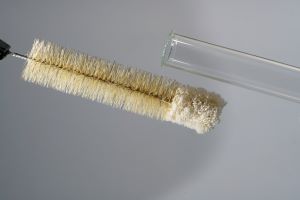 Above all, proper cleaning of Erlenmeyer flasks and the like involves selecting the right cleaning agent. In order to be able to determine this, one must first determine the type of contamination. In the laboratory, a distinction is made here between three types of soiling: organic substances, inorganic substances and microbiological substances. Alkaline to highly alkaline cleaning agents are suitable for removing organic substances such as peptides, greases or resins. Soiling with inorganic substances such as carbonates, salts and metal oxides are very well dissolved by acids. Microbiological substances are best removed with alkaline detergents and active chlorine. In addition to choosing the right detergent, the method of cleaning is also critical to the preservation of all glassware.
Above all, proper cleaning of Erlenmeyer flasks and the like involves selecting the right cleaning agent. In order to be able to determine this, one must first determine the type of contamination. In the laboratory, a distinction is made here between three types of soiling: organic substances, inorganic substances and microbiological substances. Alkaline to highly alkaline cleaning agents are suitable for removing organic substances such as peptides, greases or resins. Soiling with inorganic substances such as carbonates, salts and metal oxides are very well dissolved by acids. Microbiological substances are best removed with alkaline detergents and active chlorine. In addition to choosing the right detergent, the method of cleaning is also critical to the preservation of all glassware.
Manual or mechanical
Many laboratory glassware are dishwasher safe, so machine cleaning may seem at first glance to be the easiest solution, and in some cases it is. For example, machine cleaning in the lab not only saves time, it also prevents glass breakage and exposes personnel to fewer hazards, such as skin irritation and risk of contamination. In the home, the dishwasher saves you time and water above all.
Regardless of the application, we can recommend test tube brushes in various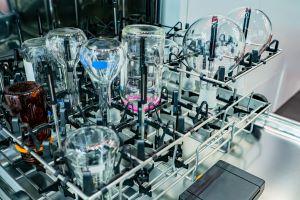 lengths and widths for cleaning test tubes. In general, brushes and cleaning sponges are very suitable for glass cleaning. When using a brush, make sure that wire parts do not damage the glass. Advantages of manual cleaning are that soiling can be treated specifically and cleaning agents can be varied in type and quantity depending on the soiling. In the laboratory, gloves and, if necessary, protective goggles should be worn during manual cleaning.
lengths and widths for cleaning test tubes. In general, brushes and cleaning sponges are very suitable for glass cleaning. When using a brush, make sure that wire parts do not damage the glass. Advantages of manual cleaning are that soiling can be treated specifically and cleaning agents can be varied in type and quantity depending on the soiling. In the laboratory, gloves and, if necessary, protective goggles should be worn during manual cleaning.
Extra tip: If you use permanent markers to label your glasses, choose the colors blue or green. These are easier to remove in the machine than black, for example.
Storage and care
Proper cleaning and care of laboratory glassware includes not only the washing process, but also drying and storage. These two points also differ slightly depending on the intended use of the glassware.
Drying
The dishwasher washes glassware so hot that it is as good as dry after the wash cycle. Depending on the use, tumbler glasses and co. can still be polished with a fine microfiber cloth to remove lime spots and streaks. After manual cleaning, it is best to place the glasses upside down on a drying rack. This dries them quickly and well, but leaves water spots and streaks. The glasses should therefore be rubbed or polished again with a cloth in any case.
Storage
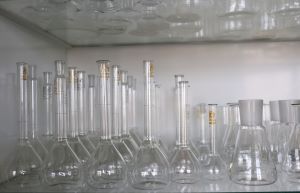 After cleaning, it is recommended that laboratory glassware be stored in closed cabinets or drawers to protect it from dust, dirt and grease. Friction between the glassware should be avoided at all costs to prevent surface damage. In laboratories, the glassware is usually locked in the cabinets. If you use a drying cabinet, it should be at least 100°C.
After cleaning, it is recommended that laboratory glassware be stored in closed cabinets or drawers to protect it from dust, dirt and grease. Friction between the glassware should be avoided at all costs to prevent surface damage. In laboratories, the glassware is usually locked in the cabinets. If you use a drying cabinet, it should be at least 100°C.
In the home, it is, for instance, also best to store your laboratory glassware in a closed cabinet to prevent contamination. Here, external damage, while annoying, is less common because the borosilicate glass is very stable and less vulnerable to damage when used in the home.
Disposal
Laboratory glassware must not be disposed of in the normal waste glass. The much more stable borosilicate glass 3.3 has a higher melting point than ’normal glass‘ (soda-lime glass) and would cause problems when melted down. You can easily dispose of laboratory glassware at home in the household waste. When disposing of laboratory glassware that has been used in the laboratory, it must be disposed of properly according to the applicable guidelines, depending on the contamination.
Summary
Proper care and cleaning of lab glasses is critical to maintaining its functionality and lifespan. Regular cleaning and careful care can help you avoid contamination and ensure the accuracy of your experiments, or enjoy their other uses. We hope this post on proper care and cleaning of lab glasses has been helpful and wish you successful experimentation. If you don’t work with lab glassware professionally, check out these five experiments for kids.

